中考英语复习——宾语从句的反义疑问句
广东中考英语专项--反义疑问句语法讲解及练习(含答案)

一、反义疑问句的基本结构与形式反义疑问句(The DisjunctiveQuestion) 即附加疑问句,是英语四大问句之一。
它表示提问人的看法,没有把握,需要对方证实。
句尾升调表示疑问,降调表示反问。
反意疑问句,由一个陈述句加上一个短问句而构成,基本构成形式是:陈述句+动词(肯定或否定)+主语?如:①She often has lunch at school, doesn’t she?②You don’t like sports, do you?反意疑问句通常对应规则:一)、反意疑问句中问句部分的动词与陈述部分的动词在语气上成相反的对应关系,即:)肯定+否定?否定+肯定?如:①You can’t do it, can you?②They are very late for the meeting, aren’t they?二)、反意疑问句中问句部分的动词与陈述部分的动词种类要对应一致。
如:①He has supper at home every day, doesn’t he? (不能用hasn’t he?)②They have known the matter, haven’t they? (不能用don’t they?)三)、反意疑问句中问句部分的动词在时态上应和陈述部分的时态一致。
如:①They will go to town soon, won’t they?(不能用don’t they?或aren’t they?)②He works very hard, doesn’t he?(不能用didn’t he?或won’t he?)基础练习1. You are an actor, ________ _____ ?2. He is a good boy, ________ ______ ?3. It was fine yesterday, _______ ___ ?4. You were studying when I called you last night, __________ _____ ?5. She is going to visit me, _____ ____?6. I am Chinese, ______ ____?7. It often rains here, ________ ___ ?8. He likes soccer, _________ ____ ?9. You have a headache, _______ ___ ?10. I called you yesterday, _______ __?11. You will go to America, ______ ___ ?12. We have ever been to Shanghai, _________ ______ ?13.His mother is a doctor, ______ ____ ?14. The dogs are fighting, _______ _____?15 There is a boy in our classroom, _______ _______ ?17. There were many cars in the street,_________ ________ ?18. There will be robots in our families,________ ______ ?19. Sit down please, _______________ ?20. Please call me, _________________?_________ ?21. Let’s go home,22. Let us go home, ________________ ?23 . Let me see, __________________ ?答案1.aren't you 2.isn't he 3.wasn't it 4.didn't you 5.won't she 6.aren't 7.doesn't it 8.doesn't he9.don't you 10.didn't you 11.won't you 12.haven't we 13.isn't she 14.aren't they 15.isn't there 17.weren't there 18.won't there 19.will you 20.will you 21.shall we22.will you 23.will you二、反义疑问句的回答反义疑问句的回答始终遵从事实,事实是肯定用Yes+肯定句,事实是否定用no+否定句,如事实是你喜欢英语:You like English,don't you? Yes,I do.(是的,我喜欢。
宾语从句反义疑问句
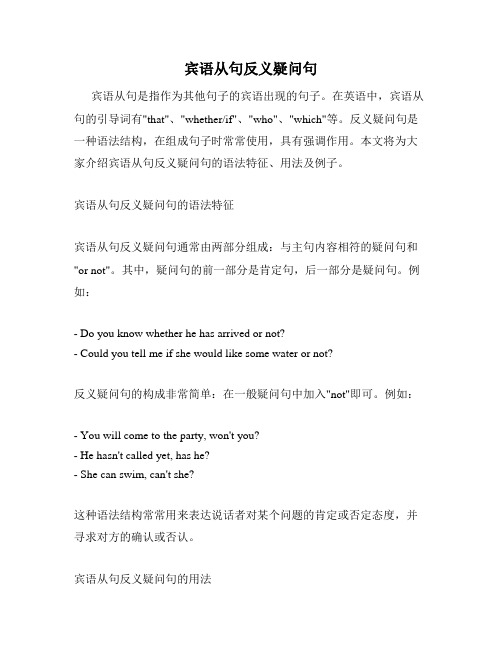
宾语从句反义疑问句宾语从句是指作为其他句子的宾语出现的句子。
在英语中,宾语从句的引导词有"that"、"whether/if"、"who"、"which"等。
反义疑问句是一种语法结构,在组成句子时常常使用,具有强调作用。
本文将为大家介绍宾语从句反义疑问句的语法特征、用法及例子。
宾语从句反义疑问句的语法特征宾语从句反义疑问句通常由两部分组成:与主句内容相符的疑问句和"or not"。
其中,疑问句的前一部分是肯定句,后一部分是疑问句。
例如:- Do you know whether he has arrived or not?- Could you tell me if she would like some water or not?反义疑问句的构成非常简单:在一般疑问句中加入"not"即可。
例如:- You will come to the party, won't you?- He hasn't called yet, has he?- She can swim, can't she?这种语法结构常常用来表达说话者对某个问题的肯定或否定态度,并寻求对方的确认或否认。
宾语从句反义疑问句的用法宾语从句反义疑问句在日常生活中经常使用。
下面列举几种常见的用法:1. 表示询问宾语从句反义疑问句最常见的用法之一是表示询问。
例如:- Do you think she will come or not?- Could you tell me whether the train has left or not?2. 表示不确定有时候我们不确定自己所说的话是否正确,这时宾语从句反义疑问句就派上用场了。
例如:- She's from Germany, isn't she?- He said he'd be here at five, didn't he?3. 表示强调宾语从句反义疑问句还可以用来强调说话者对一件事情的看法。
含有宾语从句的反义疑问句

含有宾语从句的反义疑问句在生活中,反义疑问句总是能带来一些小乐趣。
想象一下,你和朋友在咖啡馆聊得火热,突然有人问:“你喜欢喝咖啡,不是吗?”这种问法听起来既简单又有趣,对吧?你可能会点头答应,或者反驳说:“其实我更喜欢茶!”这样的句式像是在开玩笑,实际上却能引出更深层的对话。
就拿我的朋友小明来说吧。
小明特别爱运动,每次聚会前,他都会兴致勃勃地问:“你们准备去健身吗?应该去吧?”有时候我就会想,谁会拒绝呢?大家都知道健身对身体好。
可是,偏偏我总是想找借口:“哎呀,今天没时间,可能明天吧!”而小明则笑着回应:“明天又是明天,今天才是今天呀!”说的没错,咱们总是找借口,直到最后变成“明天再说”的惯例。
再比如,有次我和同事一起吃午餐,他一边吃汉堡一边问:“你觉得这个汉堡好吃吗?真不错吧?”我一边咀嚼一边点头,心里想着这真是太美味了!但其实我心里暗想,还是那碗面条更合我胃口。
不过我嘴上没说出来,最后只是附和:“对呀,超级好吃!”同事接着补充:“不过你喜欢面条嘛?”这时候,我只能笑笑,心里暗自承认自己的“小秘密”了。
在生活中,我们时常面对这样的场景。
比如,周末去看电影,朋友会问:“你觉得这部电影真有意思吗?应该值得一看吧?”我立刻想起了上次看得那部无聊透顶的片子,心里却不想让气氛冷下来,于是干脆说:“哦,对呀,特别精彩!”真是让人哭笑不得。
这些反义疑问句就像是调皮的小精灵,轻轻一戳,就能引发一阵欢笑。
反义疑问句不仅仅是为了调侃,很多时候它们还在传递一种情感。
比如,情侣之间在聊天时,女方可能会问:“你是不是还在想我?不然你怎么不发消息?”这时候,男方就得绞尽脑汁思考:“我当然想你,只是忙嘛!”真是让人感到又甜蜜又无奈。
这样的句式让人觉得既有趣又有温度,生活中的小细节常常在这种互动中悄然流露。
说到这里,反义疑问句简直就像调味品,增添了生活的色彩。
每当我们用上这样的句式,总能引发一些意想不到的反应。
有一次,我的朋友跟我说:“你知道最近的新餐馆吗?一定很好吃吧?”我立马想起上次去的那个奇葩地方,心中忍不住反问:“真的吗?上次你推荐的那个地方我还没缓过来呢!”这就是生活,充满了幽默和惊喜。
宾语从句反义疑问句否定转移
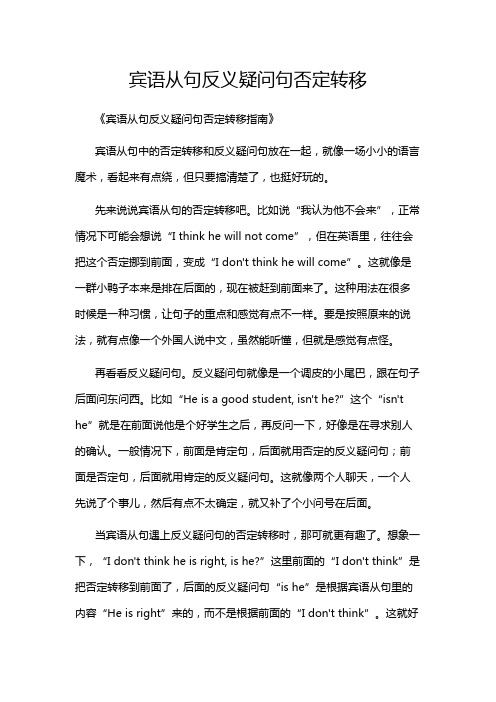
宾语从句反义疑问句否定转移《宾语从句反义疑问句否定转移指南》宾语从句中的否定转移和反义疑问句放在一起,就像一场小小的语言魔术,看起来有点绕,但只要搞清楚了,也挺好玩的。
先来说说宾语从句的否定转移吧。
比如说“我认为他不会来”,正常情况下可能会想说“I think he will not come”,但在英语里,往往会把这个否定挪到前面,变成“I don't think he will come”。
这就像是一群小鸭子本来是排在后面的,现在被赶到前面来了。
这种用法在很多时候是一种习惯,让句子的重点和感觉有点不一样。
要是按照原来的说法,就有点像一个外国人说中文,虽然能听懂,但就是感觉有点怪。
再看看反义疑问句。
反义疑问句就像是一个调皮的小尾巴,跟在句子后面问东问西。
比如“He is a good student, isn't he?”这个“isn't he”就是在前面说他是个好学生之后,再反问一下,好像是在寻求别人的确认。
一般情况下,前面是肯定句,后面就用否定的反义疑问句;前面是否定句,后面就用肯定的反义疑问句。
这就像两个人聊天,一个人先说了个事儿,然后有点不太确定,就又补了个小问号在后面。
当宾语从句遇上反义疑问句的否定转移时,那可就更有趣了。
想象一下,“I don't think he is right, is he?”这里前面的“I don't think”是把否定转移到前面了,后面的反义疑问句“is he”是根据宾语从句里的内容“He is right”来的,而不是根据前面的“I don't think”。
这就好比一个魔术师先把东西藏起来了,然后按照东西原来的位置来玩下一个把戏。
我曾经有一次在和外国朋友聊天的时候,就用到了这个。
我想说“我觉得这个电影不太好看”,我就说“I don't think this movie is very interesting”,然后我朋友就有点疑惑地看着我,我接着说“is it?”来问他的看法。
中考英语专题---- 宾语从句

中考英语专题---- 宾语从句宾语从句【考点1】宾语从句的概念宾语从句指的是在句子中起宾语作用的从句。
宾语从句分为三类:动词的宾语从句、介词的宾语从句和形容词的宾语从句。
1. 动词的宾语从句:He told us that they would help us though the whole work.I think it necessary that we take plenty of hot water every day.2. 介词的宾语从句:The new book is about how Shenzhou 6 manned spaceship was sent up into space.3. 形容词的宾语从句:I am sure I will pass the exam.He is glad that Li Ming went to see him when he was ill.例题:划出下列句子中的宾语从句。
1. None of us knows where these new parts can be bought.2. We all find it important that we (should) make a quick decision about this mater.3. We are talking about whether we admit students into our club.4. I am sorry that I have troubled you so long.参考答案:1. None of us knows where these new parts can be bought.2. We all find it important that we (should) make a quick decision about this mater.3. We are talking about whether we admit students into our club.4. I am sorry that I have troubled you so long.【考点2】宾语从句的语序陈述语序,即:主句+连词+宾语从句(主语+谓语+…)如:I hear that physics isn’t easyI want to know how soon it will begin.Could you tell me what I should do with the money?Can you imagine what kind of man he is?【注:陈述语序和疑问语序的区别】对比分析下列例句:(1) Do you like English?划线部分基本结构:_________________________ 助动词+主语+谓语动词+宾语+其他?Tom asked me if/whether I liked English.划线部分基本结构:_________________________ 引导词+主语+谓语动词+宾语+其他.(2) How will you go to Beijing?划线部分基本结构:____________________ 疑问词+助动词+主语+谓语动词+宾语+其他?Tom asked me how I would go to Beijing.划线部分基本结构:_____________________引导词+主语+助动词+谓语动词+宾语+其他.总结:疑问语序中,助动词要放在主语之前;而在陈述语序中,有时没有助动词,如果有的话要放在主语之后。
宾语从句的反义疑问句
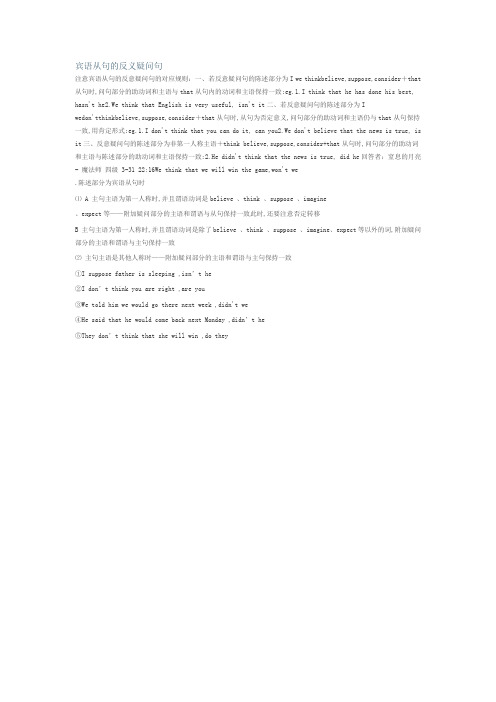
宾语从句的反义疑问句注意宾语从句的反意疑问句的对应规则:一、若反意疑问句的陈述部分为I we thinkbelieve,suppose,consider+that 从句时,问句部分的助动词和主语与that从句内的动词和主语保持一致;eg.1.I think that he has done his best, hasn't he2.We think that English is very useful, isn't it二、若反意疑问句的陈述部分为Iwedon'tthinkbelieve,suppose,consider+that从句时,从句为否定意义,问句部分的助动词和主语仍与that从句保持一致,用肯定形式;eg.1.I don't think that you can do it, can you2.We don't believe that the news is true, is it三、反意疑问句的陈述部分为非第一人称主语+think believe,suppose,consider+that从句时,问句部分的助动词和主语与陈述部分的助动词和主语保持一致;2.He didn't think that the news is true, did he回答者:窒息的月亮- 魔法师四级 3-31 22:16We think that we will win the game,won't we.陈述部分为宾语从句时⑴ A 主句主语为第一人称时,并且谓语动词是believe 、think 、suppose 、imagine、expect等——附加疑问部分的主语和谓语与从句保持一致此时,还要注意否定转移B 主句主语为第一人称时,并且谓语动词是除了believe 、think 、suppose 、imagine、expect等以外的词,附加疑问部分的主语和谓语与主句保持一致⑵主句主语是其他人称时——附加疑问部分的主语和谓语与主句保持一致①I suppose father is sleeping ,isn’t he②I don’t think you are right ,are you③We told him we would go there next week ,didn't we④He said that he would come back next Monday ,didn’t he⑤They don’t think that she will win ,do they。
初三英语中考语法一轮复习讲义(五十八)反义疑问句知识点总结与整理

2021届初三英语中考语法一轮复习讲义(五十八)反义疑问句知识点总结与整理(终结篇)反意疑问句在陈述句之后加上一个意思与之相反的简短问句,用以向对方证实所叙述的事情,这种句子叫做反意疑问句。
反意疑问句必须由意思相反的两部分组成,在前一部分(陈述句)之后用逗号,后一部分(简短问句)之后用问号。
反意疑问句的否定句必须用缩略形式,同时它的主语必须用人称代词,不能用名词。
前一部分用降调,后一部分在表示疑问时用升调,在表示强调某意思时用降调。
反意疑问句分为下面两类:①前一部分为肯定式,后一部分是否定式。
②前一部分为否定式,后一部分是肯定式。
1.陈述句(肯定式),+疑问部分(否定式)?(1)be动词的反意疑问句句型:现在:……(陈述句),isn’t/aren’t+主语?过去:……(陈述句),wasn’t/weren’t+主语?It’s a nice day,isn’t it?(今天天气很好,不是吗?)A:It was a wonderful night,wasn’t it?(那是个奇妙的夜晚,不是吗?)B:Yes,it was.(是的,它是。
)/No,it wasn’t.(不,它不是。
)A:The Greens were at home lastnight,weren’t they?(格林夫妇昨晚在家,是吗?)B:Yes,they were.(是的,他们在家。
)/No,they weren’t.(不,他们不在家。
)重要:在反意疑问句中,前后两部分的动词在人称、数和时态上通常保持一致。
另外,后一部分的人称代词应和前一部分的主语(名词或代词)保持一致。
A:Tom is skating,isn’t he?(汤姆在滑冰,不是吗?)(进行时)B:Yes,he is.(是的,他是。
)/No,he isn’t.(不,他不是。
)A:She is loved by her parents,isn’t she?(她被父母亲疼爱着,不是吗?)(被动语态)B:Yes,she is.(是的,她是。
反义疑问句知识点详解(初中英语专项复习)3

反义疑问句知识点详解(初中英语专项复习)一、定义反意疑问句又名附加疑问句。
属疑问句的一种,表示说话者对某事有一定看法,但又不完全确定,需要对方加以证实。
二、结构和原则:1.反意疑问句一般分为两个部分:前一个部分陈述句,后一部分为缩略形式的句问。
如:There is a tree in front of the building, isn’t there?2.反意疑问句遵守前肯后否, 前否后肯, 时态一致性的原则.三、用法:一.反意疑问句主语及谓语的确定.1.陈述部分含有never, few ,little,hardly,seldom,rarely(罕见), no,nothing, nobody, none, too…to 等表示否定意义的词时,其附加问句就用肯定形式.There are few people in the room, are there?She is too young to go to school, is she?2.陈述句部分是“There be…”结构时,疑问部分用“be there”.There is a tree in front of the building, isn’t there?There will not be any trouble, will there?3.陈述部分主语为this, that 等时,附加部分主语应用it.类似地,陈述部分主语为these, those等时,附加部分主语应用they.This is a beautiful picture, isn’t it?Those aren’t apple trees, are they?4.当陈述句部分动词为have(has)时有下列几种情况:(1)have在一般现在时中表示“有”之意,附加问句部分谓语可用“have”或用助动词do.Tom has a new watch, doesn’t he( hasn’t he)?(2) have to表示“不得不”“必须”之意时,附加问句部分谓语应用助动词do.Kate has to help her mother at home, doesn’t she?(3) have 表示“吃、喝、玩、度过”等意时,其附加问句的谓语应用助动词do.They have a good time in Beijing, don’t they?(4)have 在完成时中,其附加问句谓语动词应用have.Lucy has ever been to Japan, hasn’t she?(5) had better 最好,在祈使句中,其附加问句谓语动词应用hadYou had better clean the room,hadn’t you?5.肯定的祈使句的附加问句可用will you或won’t you,否定的祈使句的附加问句用will you.Listen to me carefully, will you?Don’t play with fire, will you?6.以let’s开头的祈使句,附加问句用shall we;而以let us 开头的祈使句,附加问句用will you.Let’s go to the park, shall we?Let us help you, will you?7.think, believe, expect, imagine, suppose等引导的宾语从句:A.主语是第一人称(应特别注意否定的转移)I don’t think he is bright, is he?We believe she can do it better, can’t she?B. 如果主语不是第一人称则疑问部分与主句相对应构成反意疑问句He thought they were wrong, didn’t he?8.否定前缀或后缀(否定前缀dis-, un-, im-或否定后缀-less,如dislike, discourage, unfair, unable等)不能视为否定词,其反意疑问句仍用否定形式。
反义疑问句用法及练习题(附答案)
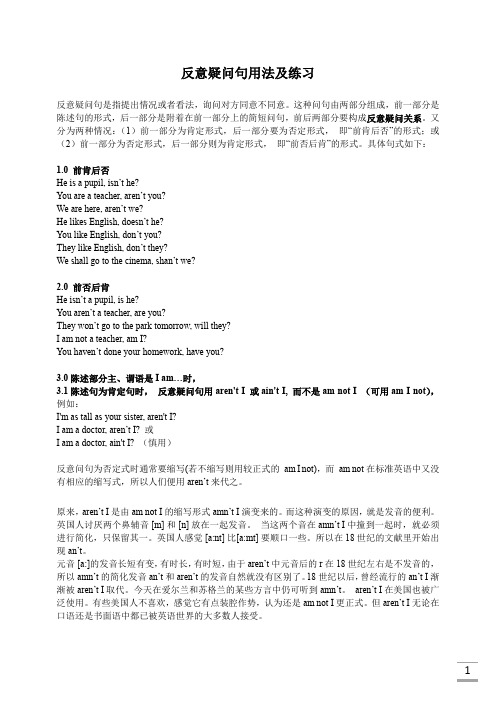
反意疑问句用法及练习反意疑问句是指提出情况或者看法,询问对方同意不同意。
这种问句由两部分组成,前一部分是陈述句的形式,后一部分是附着在前一部分上的简短问句,前后两部分要构成反意疑问关系。
又分为两种情况:(1)前一部分为肯定形式,后一部分要为否定形式,即“前肯后否”的形式;或(2)前一部分为否定形式,后一部分则为肯定形式,即“前否后肯”的形式。
具体句式如下:1.0 前肯后否He is a pupil, isn’t he?You are a teacher, aren’t you?We are here, aren’t we?He likes English, doesn’t he?You like English, don’t you?They like English, don’t they?We shall go to the cinema, shan’t we?2.0 前否后肯He isn’t a pupil, is he?You aren’t a teacher, are you?They won’t go to the park tomorrow, will they?I am not a teacher, am I?You haven’t done your homework, have you?3.0陈述部分主、谓语是I am…时,3.1陈述句为肯定句时,反意疑问句用aren't I 或ain't I, 而不是am not I (可用am I not),例如:I'm as tall as your sister, aren't I?I am a doctor, aren’t I?或I am a doctor, ain't I? (慎用)反意问句为否定式时通常要缩写(若不缩写则用较正式的am I not),而am not在标准英语中又没有相应的缩写式,所以人们便用aren’t来代之。
宾语从句反义疑问句的用法归纳
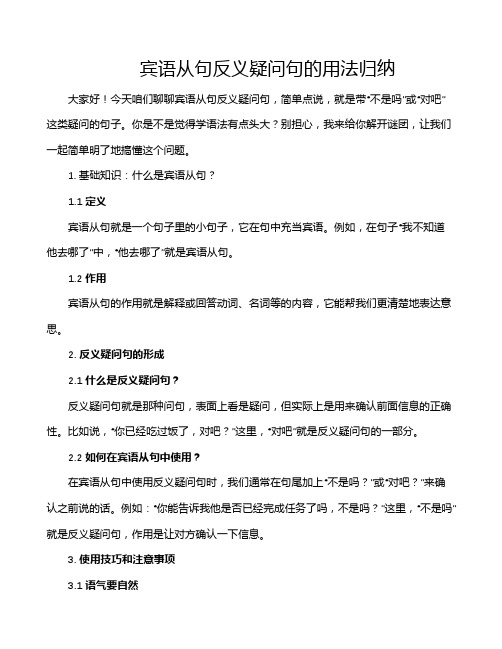
宾语从句反义疑问句的用法归纳大家好!今天咱们聊聊宾语从句反义疑问句,简单点说,就是带“不是吗”或“对吧”这类疑问的句子。
你是不是觉得学语法有点头大?别担心,我来给你解开谜团,让我们一起简单明了地搞懂这个问题。
1. 基础知识:什么是宾语从句?1.1 定义宾语从句就是一个句子里的小句子,它在句中充当宾语。
例如,在句子“我不知道他去哪了”中,“他去哪了”就是宾语从句。
1.2 作用宾语从句的作用就是解释或回答动词、名词等的内容,它能帮我们更清楚地表达意思。
2. 反义疑问句的形成2.1 什么是反义疑问句?反义疑问句就是那种问句,表面上看是疑问,但实际上是用来确认前面信息的正确性。
比如说,“你已经吃过饭了,对吧?”这里,“对吧”就是反义疑问句的一部分。
2.2 如何在宾语从句中使用?在宾语从句中使用反义疑问句时,我们通常在句尾加上“不是吗?”或“对吧?”来确认之前说的话。
例如:“你能告诉我他是否已经完成任务了吗,不是吗?”这里,“不是吗”就是反义疑问句,作用是让对方确认一下信息。
3. 使用技巧和注意事项3.1 语气要自然说到反义疑问句,它得听起来自然,不要让人觉得你在咬文嚼字。
比如:“你明天能来,不是吗?”这句话听起来就很自然、很亲切,不会让人觉得有压力。
3.2 保持一致性反义疑问句的主语和谓语要与主句保持一致。
例如:“她已经告诉你她的计划了,对吧?”在这种情况下,主句和反义疑问句的主语和谓语都得一致,才能让句子流畅自然。
4. 实际例子4.1 日常对话中的应用想象一下你和朋友聊工作:“你们下周开会的时间确定了吗?对吧?”这样问不仅确认了信息,还能让对方觉得你很在乎他们的安排。
4.2 正式场合中的使用在正式场合,你可能会说:“您已经收到我们的邮件了,是不是?”这样不仅礼貌,还能确认对方是否收到了你的信息。
5. 总结总的来说,宾语从句反义疑问句就是在宾语从句中加上类似“不是吗?”的疑问词,以确认之前说的内容。
这种用法在日常对话和正式场合中都很常见,只要掌握了基本规则,大家就能很轻松地使用它了。
宾语从句的否定转移的反义疑问句
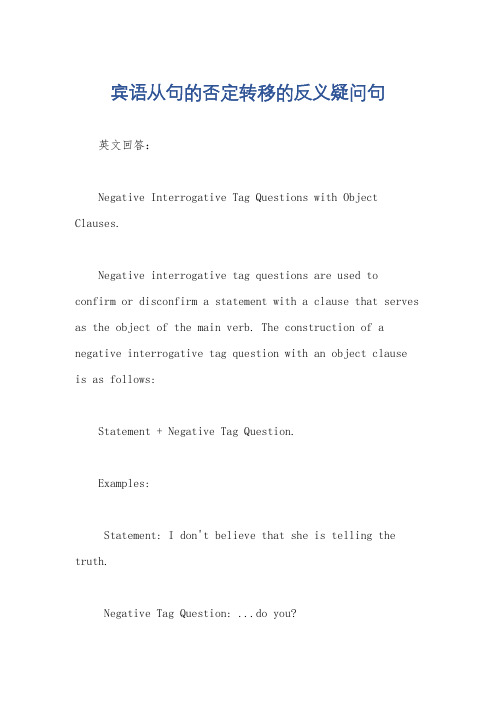
宾语从句的否定转移的反义疑问句英文回答:Negative Interrogative Tag Questions with Object Clauses.Negative interrogative tag questions are used to confirm or disconfirm a statement with a clause that serves as the object of the main verb. The construction of a negative interrogative tag question with an object clause is as follows:Statement + Negative Tag Question.Examples:Statement: I don't believe that she is telling the truth.Negative Tag Question: ...do you?Statement: It is not possible to finish the project by Friday.Negative Tag Question: ...is it?Statement: He said that he would come tomorrow.Negative Tag Question: ...didn't he?Guidelines for Forming Negative Tag Questions with Object Clauses:1. The tag question is always negative.2. The subject of the tag question is a pronoun that refers to the object of the main clause.3. The auxiliary verb in the tag question is the negative form of the auxiliary verb used in the main clause.4. The tag question is separated from the main clauseby a comma.Common Mistakes to Avoid:Do not use the pronoun "you" as the subject of the tag question if the object of the main clause is a third person.Do not use the auxiliary verb "do" in the tag question if the main clause is in the present tense.Do not forget to use a comma to separate the tag question from the main clause.中文回答:宾语从句的否定转移的反义疑问句。
三大从句及反义疑问句及其答案
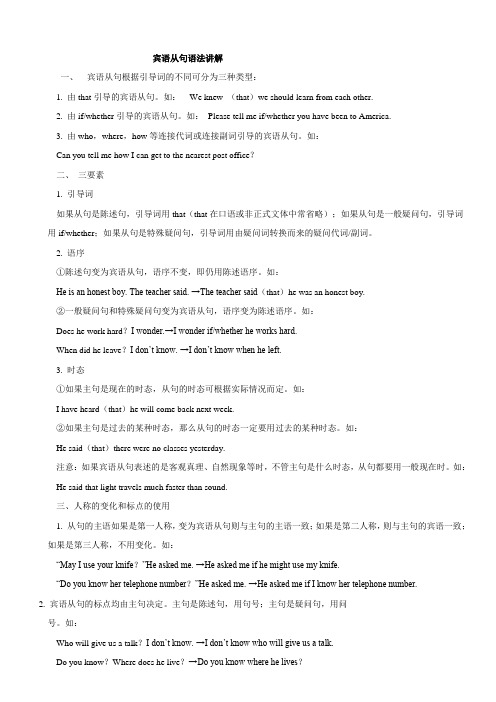
宾语从句语法讲解一、宾语从句根据引导词的不同可分为三种类型:1. 由that引导的宾语从句。
如:We knew (that)we should learn from each other.2. 由if/whether引导的宾语从句。
如:Please tell me if/whether you have been to America.3. 由who,where,how等连接代词或连接副词引导的宾语从句。
如:Can you tell me how I can get to the nearest post office?二、三要素1. 引导词如果从句是陈述句,引导词用that(that在口语或非正式文体中常省略);如果从句是一般疑问句,引导词用if/whether;如果从句是特殊疑问句,引导词用由疑问词转换而来的疑问代词/副词。
2. 语序①陈述句变为宾语从句,语序不变,即仍用陈述语序。
如:He is an honest boy. The teacher said. →The teacher said(that)he was an honest boy.②一般疑问句和特殊疑问句变为宾语从句,语序变为陈述语序。
如:Does he work hard?I wonder.→I wonder if/whether he works hard.When did he leave?I don’t know. →I don’t know when he left.3. 时态①如果主句是现在的时态,从句的时态可根据实际情况而定。
如:I have heard(that)he will come back next week.②如果主句是过去的某种时态,那么从句的时态一定要用过去的某种时态。
如:He said(that)there were no classes yesterday.注意:如果宾语从句表述的是客观真理、自然现象等时,不管主句是什么时态,从句都要用一般现在时。
宾语从句反意疑问句
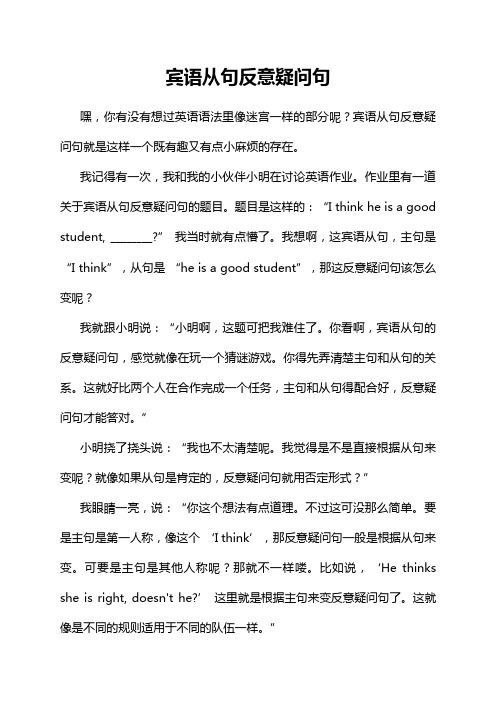
宾语从句反意疑问句嘿,你有没有想过英语语法里像迷宫一样的部分呢?宾语从句反意疑问句就是这样一个既有趣又有点小麻烦的存在。
我记得有一次,我和我的小伙伴小明在讨论英语作业。
作业里有一道关于宾语从句反意疑问句的题目。
题目是这样的:“I think he is a good student, ________?” 我当时就有点懵了。
我想啊,这宾语从句,主句是“I think”,从句是“he is a good student”,那这反意疑问句该怎么变呢?我就跟小明说:“小明啊,这题可把我难住了。
你看啊,宾语从句的反意疑问句,感觉就像在玩一个猜谜游戏。
你得先弄清楚主句和从句的关系。
这就好比两个人在合作完成一个任务,主句和从句得配合好,反意疑问句才能答对。
”小明挠了挠头说:“我也不太清楚呢。
我觉得是不是直接根据从句来变呢?就像如果从句是肯定的,反意疑问句就用否定形式?”我眼睛一亮,说:“你这个想法有点道理。
不过这可没那么简单。
要是主句是第一人称,像这个‘I think’,那反意疑问句一般是根据从句来变。
可要是主句是其他人称呢?那就不一样喽。
比如说,‘He thinks she is right, doesn't he?’ 这里就是根据主句来变反意疑问句了。
这就像是不同的规则适用于不同的队伍一样。
”咱们再看个例子哈。
“She said that she had been to Paris, didn't she?” 这里主句是“She said”,因为主句是第三人称,所以反意疑问句是根据主句来变的。
这就好比不同的房子有不同的大门,你得找对大门才能进去。
还有哦,要是遇到否定转移的情况呢?比如说“I don't think he will come, w ill he?” 这里虽然主句看起来是否定的,但实际上是否定从句的内容,所以反意疑问句还是根据从句来变,而且要用肯定形式。
这就像是表面上看到的和实际情况有点不一样,你得透过现象看本质。
中考英语专题复习 反义疑问句知识讲解

反义疑问句反义疑问句(The Disjunctive Question 或 Question tags) 即附加疑问句。
它表示提问人的看法,没有把握,需要对方证实。
反义疑问句由两部分组成:前一部分是一个陈述句,后一部分是一个简短的疑问句,两部分的人称时态应保持一致。
主要形式:陈述部分肯定式+疑问部分否定式;陈述部分否定式+疑问部分肯定式。
陈述部分和疑问部分要么前肯后否,要么前否后肯。
这类反义疑问句有时带有感情色彩,表示惊奇,愤怒,讽刺,不服气等。
例如:You call this a day's work,don't you?你说这就叫一天的活儿,不是吗?目录1什么是反义疑问句2反义疑问句的答案3句子结构4速记方法5主语一般词语6重点归纳7其他信息什么是反义疑问句1.英语中,反义疑问句是由陈述句和附在其后的附加疑问句组成。
其中附加疑问句是对陈述句所说的事实或观点提出疑问,起证实作用,一般用于证实说话者所说的事实或观点。
翻译为“是吗"句子结构1.陈述部分肯定句+疑问部分否定句(可记为前肯后否).例:They work hard, don’t they?Let's go to the supermarket ,shall we?2.陈述部分否定句+疑问部分肯定句(可记为前否后肯).例:You didn't go, did you?句子类型一种是反义的附加疑问句;一种是非反义的附加疑问句。
简单来说,就是“前肯后否”或“前否后肯”。
反义疑问句的答案1.前肯后否:回答时,如果情况属实,用Yes加上反问句的倒装肯定句;如果情况不属实,则用No加上反问句的倒装否定句。
例如You were moved by your stud ents, weren’t反义疑问句you?情况属实:Yes, I was. 情况不属实:No, I wasn't2.前否后肯::回答时,如果情况属实,用No加上反问句的倒装否定句。
带有宾语从句的主从复合句反义疑问句

带有宾语从句的主从复合句反义疑问句下载提示:该文档是本店铺精心编制而成的,希望大家下载后,能够帮助大家解决实际问题。
文档下载后可定制修改,请根据实际需要进行调整和使用,谢谢!本店铺为大家提供各种类型的实用资料,如教育随笔、日记赏析、句子摘抄、古诗大全、经典美文、话题作文、工作总结、词语解析、文案摘录、其他资料等等,想了解不同资料格式和写法,敬请关注!Download tips: This document is carefully compiled by this editor. I hope that after you download it, it can help you solve practical problems. The document can be customized and modified after downloading, please adjust and use it according to actual needs, thank you! In addition, this shop provides you with various types of practical materials, such as educational essays, diary appreciation, sentence excerpts, ancient poems, classic articles, topic composition, work summary, word parsing, copy excerpts, other materials and so on, want to know different data formats and writing methods, please pay attention!1. 简介在汉语中,主从复合句是一种常见的句型结构,它由主句和一个或多个从句组成。
宾语从句的反义疑问句

宾语从句的反义疑问句英语中,反意疑问句是由陈述句和附在其后的附加疑问句组成。
其中附加疑问句是对陈述句所说的事实或观点提出疑问,起证实作用,一般用于证实说话者所说的事实或观点。
注意:偏齿疑问句前后两部分谓语应当就是,“确实陈述+驳斥疑点”或“驳斥陈述+确实疑点”简略问句如果是否定式,not应与be,do,will等系动词、助动词、情态动词缩写简略问句的主语不必名词,应用领域人称代词当说话者的目的不在疑问,而是为了加强语气时,用降调当骂人者的目的在疑点,则用调值陈述部分含“too...to”时,是否定句1) 陈述部分的主语就是i,疑点部分必须用 aren't i.i'm as tall as your sister,aren't i?(我和你姐姐一样低,对吗?)2) 陈述部分的谓语是wish,疑问部分要用may +主语。
i wish to have a word with you, may i?(我希望可以和你说话,可以吗?)3) 陈述部分用 no, nothing, nobody, never, few, seldom, hardly, rarely,little等驳斥含义的词时,疑点部分用确实含义。
the swede made no answer, did he / she?some plants never blown (开花), do they ?4) 含有ought to 的反意疑问句,陈述部分是肯定的,疑问部分用shouldn't / oughtn't +主语。
he ought to know what to do, oughtn't he? / shouldn't he?5) 陈述部分有have to +v. (had to + v.),疑问部分常用don't +主语(didn't +主语)。
we have to get there at eight tomorrow, don't we?6) 陈述部分的谓语是used to 时,疑问部分用didn't +主语或 usedn't +主语。
中考英语语法考点知识复习-反义疑问句
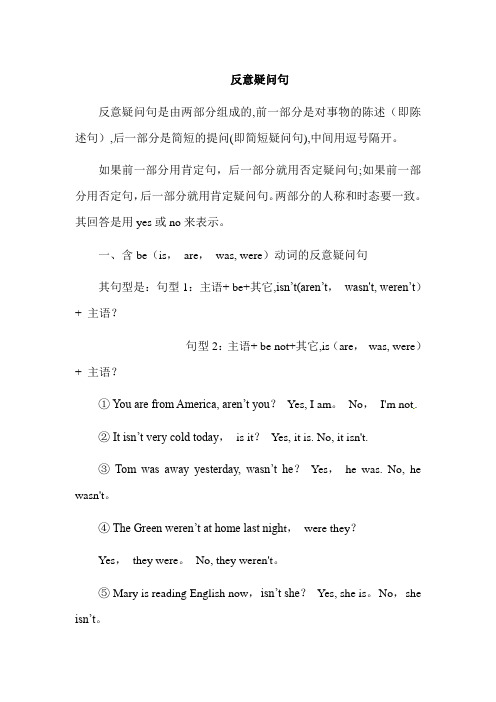
反意疑问句反意疑问句是由两部分组成的,前一部分是对事物的陈述(即陈述句),后一部分是简短的提问(即简短疑问句),中间用逗号隔开。
如果前一部分用肯定句,后一部分就用否定疑问句;如果前一部分用否定句,后一部分就用肯定疑问句。
两部分的人称和时态要一致。
其回答是用yes或no来表示。
一、含be(is,are,was, were)动词的反意疑问句其句型是:句型1:主语+ be+其它,isn’t(aren’t,wasn't, weren’t)+ 主语?句型2:主语+ be not+其它,is(are,was, were)+ 主语?① You are from America, aren’t you?Yes, I am。
No,I'm not.② It isn’t very cold today,is it?Yes, it is. No, it isn't.③Tom was away yesterday, wasn’t he?Yes,he was. No, he wasn't。
④ The Green weren’t at home last nigh t,were they?Yes,they were。
No, they weren't。
⑤ Mary is reading English now,isn’t she?Yes, she is。
No,she isn’t。
⑥ Your parents aren't going to have a party this Sunday,are they?Yes,they are. No,they aren't。
⑦ The girls were singing when the teacher came in,weren’t they?Yes, they were。
No,they weren’t。
注意:There be句型① There is an old picture on the wall, isn’t there?Yes,there is. No, there isn’t。
初中英语反义疑问句的用法归纳
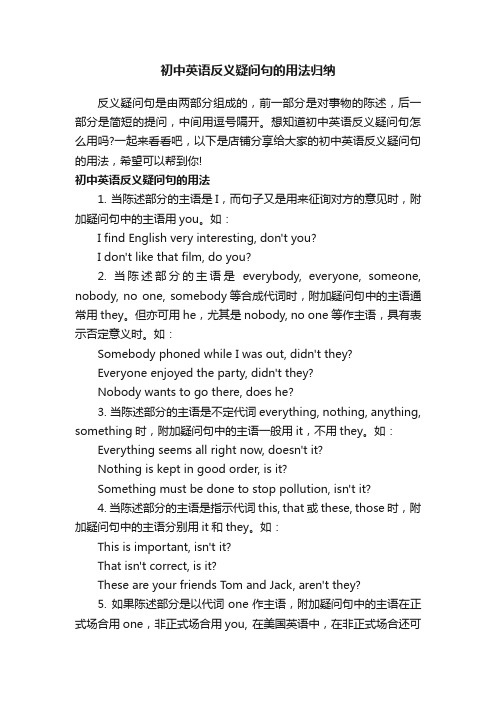
初中英语反义疑问句的用法归纳反义疑问句是由两部分组成的,前一部分是对事物的陈述,后一部分是简短的提问,中间用逗号隔开。
想知道初中英语反义疑问句怎么用吗?一起来看看吧,以下是店铺分享给大家的初中英语反义疑问句的用法,希望可以帮到你!初中英语反义疑问句的用法1. 当陈述部分的主语是I,而句子又是用来征询对方的意见时,附加疑问句中的主语用you。
如:I find English very interesting, don't you?I don't like that film, do you?2. 当陈述部分的主语是everybody, everyone, someone, nobody, no one, somebody等合成代词时,附加疑问句中的主语通常用they。
但亦可用he,尤其是nobody, no one等作主语,具有表示否定意义时。
如:Somebody phoned while I was out, didn't they?Everyone enjoyed the party, didn't they?Nobody wants to go there, does he?3. 当陈述部分的主语是不定代词everything, nothing, anything, something时,附加疑问句中的主语一般用it,不用they。
如:Everything seems all right now, doesn't it?Nothing is kept in good order, is it?Something must be done to stop pollution, isn't it?4. 当陈述部分的主语是指示代词this, that或these, those时,附加疑问句中的主语分别用it和they。
如:This is important, isn't it?That isn't correct, is it?These are your friends Tom and Jack, aren't they?5. 如果陈述部分是以代词one作主语,附加疑问句中的主语在正式场合用one,非正式场合用you, 在美国英语中,在非正式场合还可以用he。
中考英语语法复习-宾语从句

中考语法复习——宾语从句在句子中起宾语作用的从句叫做宾语从句.一、宾语从句分为三类:A、动词(包括动词短语)的宾语从句;B、介词的宾语从句;C、形容词的宾语从句。
1动词的宾语从句a)大多数动词都可以带宾语从句We all expect that they will win, for members of their team are stronger.我们都预料他们会赢,因为他们的队员更强壮.He told us that they would help us through the whole work.他告诉我们在整个工作中,他都会帮忙的.b)部分“动词+副词”结构也可以带宾语从句I have found out that all the tickets for the concert have been sold out.我发现这场音乐会的所有票都卖光了.Can you work out how much we will spend during the trip?你能计算出这次旅行我们将花费多少钱吗?c)动词短语也可以带宾语从句常见的这些词有:make sure确保make up one’s mind下决心keep in mind牢记1) Make sure that there are no mistakes in your papers before you turn them in.在上交试卷前确保没有任何错误.d)可运用形式宾语it代替的宾语从句①动词find/feel/consider/make/believe等后面有宾语补足语的时候, 则需要用it 做形式宾语而将that宾语从句后置.1)I think it necessary that we take plenty of hot water every day.我认为每天多喝开水是有必要的.2)I have made it a rule that I keep diaries.我每天写日记成了习惯.3) We all find it important that we (should) make a quick decision about this matter.我们都认为对这件事马上做出决定很重要.②有些动词带宾语从句时需要在宾语与从句前加it这类动词主要有: hate/ take/ owe/ have/ see to.1) He will have it that our plan is really practical.他会认为我们的计划确实可行.2) We take it that you will agree with us.我们认为你会同意我们的.3) When you start the engine, you must see to it that car is in neutral[nju:trəl]n. (汽车或其他机器的)空挡位置.开启发动机时, 一定要使汽车的离合器处于空挡位置.③若宾语从句是wh-类, 则不可用it代替We all consider what you said to be unbelievable.我们都认为你所说的是不可信的.We discovered what we had learned to be valuable.我们发现我们所学到的东西都是有用的.2介词的宾语从句1) 用wh-类的介词宾语从句a) We are talking about whether we admit students into our club.我们正在讨论是否让学生加入我们的俱乐部.b) The new book is about how Shenzhou VI manned spaceship was sent up into space.这本新书是关于神州6号载人航天飞船是如何升如太空的.2) 用that, if引导的介词宾语从句有时候except/but/besides三个介词后可见到that引导的宾语从句a) I know nothing about my new neighbor except that he used to work with a company.对于我的新邻居我只知道他曾在一家公司上班,其他一无所知.3 形容词的宾语从句常用来引导宾语从句的形容词有:sure/ certain/ glad/ pleased/ happy/ sorry/ satisfied/ surprised等。
i think引导的宾语从句的反义疑问句
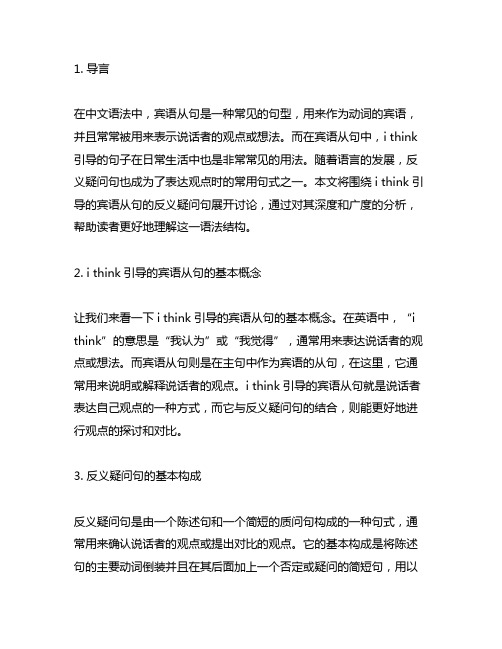
1. 导言在中文语法中,宾语从句是一种常见的句型,用来作为动词的宾语,并且常常被用来表示说话者的观点或想法。
而在宾语从句中,i think 引导的句子在日常生活中也是非常常见的用法。
随着语言的发展,反义疑问句也成为了表达观点时的常用句式之一。
本文将围绕i think引导的宾语从句的反义疑问句展开讨论,通过对其深度和广度的分析,帮助读者更好地理解这一语法结构。
2. i think引导的宾语从句的基本概念让我们来看一下i think引导的宾语从句的基本概念。
在英语中,“i think”的意思是“我认为”或“我觉得”,通常用来表达说话者的观点或想法。
而宾语从句则是在主句中作为宾语的从句,在这里,它通常用来说明或解释说话者的观点。
i think引导的宾语从句就是说话者表达自己观点的一种方式,而它与反义疑问句的结合,则能更好地进行观点的探讨和对比。
3. 反义疑问句的基本构成反义疑问句是由一个陈述句和一个简短的质问句构成的一种句式,通常用来确认说话者的观点或提出对比的观点。
它的基本构成是将陈述句的主要动词倒装并且在其后面加上一个否定或疑问的简短句,用以表示对观点的提问或确认。
“I think you like the movie, don't you?” 中的“don't you”就是反义疑问句的组成部分。
通过这种句式的构成,语言交际者可以更好地传达自己的观点,并且引发对方的反应和对比意见。
4. i think引导的宾语从句与反义疑问句的结合当i think引导的宾语从句结合反义疑问句时,常常可以用来对说话者的观点进行确认或提出对比的观点。
“I think he is honest, isn't he?”这句话中,“I think he is honest”表达了说话者的观点,“isn't he”则用来确认或提出对比的观点。
通过这种句式的运用,说话者可以更好地进行观点的交流和引发对方的反应,从而增加语言交际的广度和深度。
- 1、下载文档前请自行甄别文档内容的完整性,平台不提供额外的编辑、内容补充、找答案等附加服务。
- 2、"仅部分预览"的文档,不可在线预览部分如存在完整性等问题,可反馈申请退款(可完整预览的文档不适用该条件!)。
- 3、如文档侵犯您的权益,请联系客服反馈,我们会尽快为您处理(人工客服工作时间:9:00-18:30)。
musician. ③He is wondering:“ What is Leo going to?” →He is wondering what Leo is going to be.
宾语从句的反义疑问句
宾语从句构成:
1.确定引导词(根据从句句式)
从句的句式
陈述句
一般疑问句
特殊疑问句
祈使句
肯定句 否定句
连接词 that
if(whether) 特殊疑问词 to+动词原形
not to+动词原形
2.确定从句语序(从句为陈述句语序) 3.确定从句的时态(根据主句时态)
主句时态 一般现在时 一般过去时
④I suppose father is sleeping,______ ______? ⑤I don’t think you are right,_____ _____?
⑥She saபைடு நூலகம்d that he didn’t like it, ________ ________?
⑦He knows where I live, ________ ________?
2. 由于宾语从句要否定前移,当反意疑 问句的陈述部分为 I (we)don’t think(believe,suppose,consider) +that从句时,从句即为否定意义,附 加疑问句的动词和主语仍要与that从句 保持一致,用肯定形式。
eg.
①I don't think that you can do it, can you?
②We don't believe that the news is true, is it?
总 结:
一般情况下,宾语从句的宾语从句的
附加疑问句由主句而定,特殊情况句型为:
I /we (don’t/didn’t)think ( believe,
想,认为 相信
suppose, consider, expect)+that从句
猜想
认为 期望
练习:
①They all think that English is very useful, ________ ________?
②He didn't think that the news is true, ________ ________?
③We think that we will win the game, ________ ________?
从句时态
连接前
连接后
时态保持不变
一般现在时
一般过去时
一般过去时
一般过去时
一般将来时
过去将来时
现在进行时
过去进行时
现在完成时
过去完成时
即:
1.主句为现在时,从句的时态可以为 任何时态。
2.主句为过去时,从句的时态为过去 时的一种
3.从句为客观真理、自然现象、永恒 不变的规律,只用一般现在时
eg. ①He says:“ Leo is going to be a musician.” →He says (that) Leo is going to be a
③They don’t think that she will win ,do they ?
特 殊:
1.若反意疑问句的陈述部分为 I (we) think(believe,suppose,consider, expect )+that从句时,附加疑问句的 动词和主语与从句一致。
eg. ① I think that he has done his best, hasn't he? ② We think that English is very useful, isn't it?
⑧I think that it is too short, ________ ________?
⑨I don’t think he will come, ________ ________?
• 宾语从句的反义疑问句 = 陈述句(主句+从句)+ 附加疑问句? 附加疑问句的主语和谓语与主句一致。
①We told him that we would go there next week ,didn't we ?
②He says he will come back next Monday , doesn’t he ?
